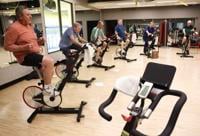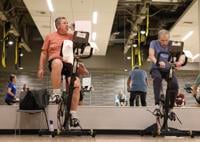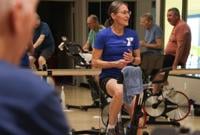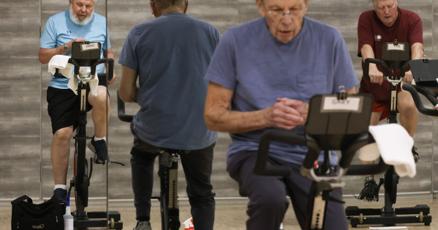Steve Boggess wants to stay fit as he gets older. The 73-year-old is a longtime member of the YMCA and works out twice a week with the Not So Buff club at the YMCA and Yakima Rotary Aquatic Center.
He also attends Pedaling for Parkinson’s classes. Boggess was diagnosed with Parkinson’s disease in early May 2019. The progressive nervous system disorder affects movement, resulting in trembling of hands, arms, legs, jaw and face. Other symptoms include stiffness of arms, legs and the trunk; slow movement; poor coordination and balance and difficulty speaking.
There is no cure.
A national program offered locally by the Yakima YMCA, Pedaling for Parkinson’s involves pedaling a bicycle at a rapid pace, ideally 80-90 revolutions per minute. Research has shown that pedaling a bicycle for an hour three times a week over eight weeks could reduce Parkinson’s symptoms by as much as 35%.
Participants work toward their goals and track their progress. “It’s challenging from an endurance aspect, but it’s not difficult,” said Boggess, who lives in Yakima.
The 12-week series involves hourlong classes at 1:45 p.m. Monday, Wednesday and Friday. Participants must provide medical clearance and register by filling out a form available at the Yakima YMCA. It’s free for the first eight weeks; a YMCA membership is required after that.

Men peddle their stationary bikes during a Pedaling for Parkinson’s spin class at the YMCA Yakima Rotary Aquatic Center Thursday, March 7, 2024, in Yakima, Wash.
The program was offered at the downtown YMCA before the pandemic. It returned with the current series of classes, which began Jan. 8; another set of classes begins April 1. There’s been a great turnout, said Roxann Johnson, health and wellness director for the Yakima YMCA.
YMCA trainers rotate leading classes, with two usually attending. Depending on bike availability, participants may bring a support person.
Johnson is a big fan of Pedaling for Parkinson’s. Twelve participants registered for the current series of classes and she hopes more join the next session. “We have 29 bikes. I want to max it out,” she said.
Dopamine and symptoms
Boggess learned more about Pedaling for Parkinson’s when Johnson talked about it during a Parkinson’s support group meeting at the Harman Center in Yakima. He already knew Johnson from her work with the Not So Buff club and was eager to see how it could help.
After warming up for a recent class, Boggess was hitting the mid-80s for revolutions per minute, with his bike resistance set at 12. His endurance and leg strength have improved since classes began, and he has seen other positive results from his hard work.
“It’s helped a lot with my range of motion and my mood,” Boggess said. “It gets us together with other people, which is really good. … And my sciatica is gone.”

Steve Boggess, left, and Gary Bailey, right, pedal stationary bikes during a Pedaling for Parkinson’s spin class at the YMCA Yakima Rotary Aquatic Center Thursday, March 7, 2024, in Yakima, Wash.
Most Parkinson’s symptoms are caused by a lack of dopamine in the brain, according to the Parkinson’s Foundation. Dopamine is a chemical that helps brain cells communicate with each other. Many Parkinson’s drugs temporarily replenish dopamine or mimic the action of dopamine, which is also produced by high-intensity exercise.
A new pilot study showed that high-intensity exercise can even reverse neurodegeneration in those with Parkinson’s, according to a February article from the Yale University School of Medicine.
“A small proof-of-concept study involving 10 patients showed that high-intensity aerobic exercise preserved dopamine-producing neurons, the brain cells that are most vulnerable to destruction in patients with the disease,” the article said. “In fact, after six months of exercise, the neurons actually had grown healthier and produced stronger dopamine signals.”
That’s great news and yet another reason for getting involved with Pedaling for Parkinson’s. Boggess encourages those who could benefit to get involved.
“It’s really exhilarating. They can push the limits on this and it’s a really good feeling,” he said.
Making a difference
Larry Ratts wasn’t sure at first but he definitely wanted to try Pedaling for Parkinson’s. Like Boggess he heard about it at the Parkinson’s support group, and got the necessary medical clearance. Ratts was diagnosed last June. He is 80 years old and initially needed a step to get up on the bike. But that didn’t last long, just the first four times he attended.
After a few weeks, Ratts found the bike adjustments that work ideally for him. He now has his own stationary bike at home and works out on that when he can.
“It’s really helped. It’s way beyond what I thought I would ever do. About half the time I’m at 80” revolutions per minute, Ratts said as he pedaled.
“Two months ago, I couldn’t pedal and talk,” he added. “I think my balance has improved.”

Ilene Gerardi leads a Pedaling for Parkinson’s spin class at the YMCA Yakima Rotary Aquatic Center Thursday, March 7, 2024, in Yakima, Wash.
Ratts feels strongly that Parkinson’s is under-diagnosed in the Yakima Valley, in part because people don’t always pick up on the signals of the disease, he said. He “didn’t put the whole story together” himself, and since he was diagnosed, Ratts has tried to bring more attention to Parkinson’s, its symptoms and treatments.
Along with the physical benefits of Pedaling for Parkinson’s, Ratts enjoys the friendliness and camaraderie of the classes. The trainers and participants welcomed him and offer encouragement and advice when sought.
“Everybody has support here,” he said.
This news item came from: https://www.yakimaherald.com/news/local/pedaling-for-parkinsons-classes-in-yakima-help-alleviate-symptoms-and-offer-support/article_719cd99e-d676-11ee-bec1-e3345f45b56c.html





